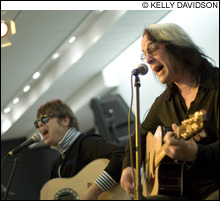
A NEW DRIVER: With their original leader unwilling to tour, the New Cars have drafted Todd Rundgren.
|
How do you revive a legendary band when the frontman isn’t interested? The conventional wisdom would be don’t try, especially if the band are Boston’s legendary the Cars, where, along with Ric Ocasek, you’d also have to find fill-ins for deceased singer/bassist Ben Orr and retired drummer David Robinson. That leaves only two-fifths of the original band: keyboardist Greg Hawkes and guitarist Elliot Easton, along with a frontman in Todd Rundgren who had only a faint connection to the original band (he produced a Jules Shear album that Easton played on).The obvious contemporary comparisons are the Doors with Ian Astbury, or Queen with Paul Rogers — the first a total fiasco, the second a relative fiasco. A more fitting analog might be 1999’s David Byrne-less Talking Heads reunion, when the remaining members carried on as the Heads. The group’s multi-singer album No Talking, Just Head was terrible; onstage it came together. On tour with one singer, Concrete Blonde’s Johnette Napolitano, the Heads rediscovered their chemistry.
The remaining Cars have gone a step further with Rundgren, effectively merging with his late-’70s/early- ’80s band Utopia. Bassist Kasim Sulton was the Ben Orr of Utopia — the sex symbol who sang the romantic tunes. (He sings “Drive” in the New Cars.) And ex-Tubes drummer Prairie Prince had a hand in many Rundgren-produced projects, notably XTC’s Skylarking.
Not surprisingly, the live portions of the New Cars’ It’s Alive (Rhino) sound like Utopia doing the Cars. And 15 of the 18 tracks are live. Of those, 12 are Cars covers (from “Just What I Needed” and “Candy O” to “Drive” – i.e., all the expected hits). It’s fun, the arrangements are accurate, and it’s more lively than the notoriously static, Ric Ocasek-led Cars were once they’d discovered sequencers. All of the trademark parts by Easton and Hawkes are in place, right down to the sharp guitar solo on “Best Friend’s Girl,” and Rundgren treats the songs with affection, doing an occasional Orr or Ocasek imitation but mostly singing in his own style. It’s not the Cars, but it is a fresh take on material that holds up just fine. (How many bands can boast a debut album with as many hits as The Cars?)
The payoff for Rundgren fans is “Not Tonight,” a new song that appears here in both live and studio versions. Rundgren’s talent for mimicry came to the fore on Utopia’s Deface the Music (an album of fake Beatles songs, plus one faux Billy Joel tune). But on “Not Tonight” he gives a good-natured ribbing to Ocasek’s idiosyncrasies in a song that’s as sly and catchy as vintage Cars. “Warm,” another new track, is an obvious stab at a techno ballad in the “Drive” vein, while “More” could be a peak-era Utopia rocker. But it’s “Not Tonight” that makes the strongest case for the future of this band — even if more than one wag has pointed out that the New Cars would be more properly called Autopia.
“Don’t think that we didn’t consider that name ourselves,” Rundgren pointed out during a recent phone interview. “We realized early on that this isn’t really me joining the Cars; it’s two bands getting together. But the Cars is a bigger brand name, and it’s one that we can leverage.” The jury’s still out on whether the New Cars will last beyond the current tour with Blondie, which brings them to the Pavilion on June 7. “It’s a band for the purposes of an album,” Rundgren says. “And it’s going to use up everybody’s resources for the next year. After that, if we’re all still friends we’ll discuss the possibility of some new music.”
The three new songs on the disc were written as collaborations, with Hawkes and Easton devising the riffs and chord progressions, and Rundgren handling the lyrics and vocal melodies. “In the case of ‘Not Tonight,’ the ideas that Greg and Elliot came up with were so inherently Cars-ish that it wasn’t a stretch for me to come up with something. A high degree of sexual innuendo was required. You don’t sing about world peace in a Cars song. And there had to be enough abstraction in the lyrics for the song to be open to wider interpretation. If I did anything wrong, I probably made the lyrics mean too much.”
If that sounds like a slam, it’s not. “He [Ocasek] was one of the originals. He did something that was highly imitated at the time. During the punk rock movement, you were supposed to sing about politics or society or how pissed off you were. You were never supposed to sing about girls. Ric took things back to the classic, Hoagy Carmichael mode of songwriting, where it came back to a boy and a girl. But he did it in a different way. It wasn’t just ‘Oh baby, you broke my heart.’ Detached college kids could relate to it.”